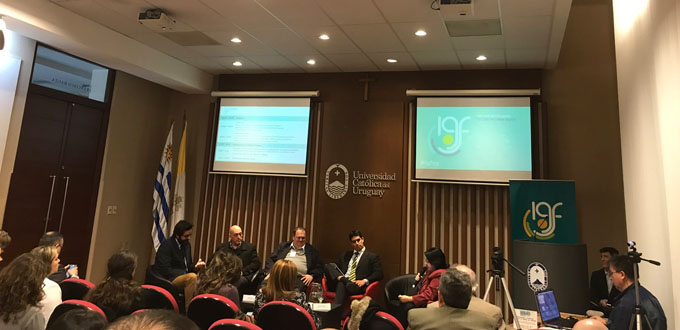New Internet Governance Spaces
20/12/2017

Through its Leaders project, this year LACNIC has promoted the discussion of the most relevant Internet governance issues at national forums held in Costa Rica, Guatemala, Peru, Bolivia, Argentina, Panama, and Uruguay, as well as at LACIGF – a regional space devoted to the strengthening of the Internet.
As the Internet becomes increasingly relevant in the social and economic life of every citizen, the construction of a collaborative Internet model is also gaining greater importance, particularly through a multiplicity of voices in decision-making processes regarding how resources are managed.
LACNIC created Leaders to strengthen governance forums throughout the region and thus encourage and facilitate the participation of its experts in these platforms and promote the multistakeholder model, under which all interested sectors can contribute so that the Internet will take into account their interests.
This year, Leaders specifically provided support to new spaces aimed at establishing good practices in Internet governance debates, said Kevon Swift, Head of Strategic Relations and Integration at LACNIC.
“A new generation of spaces and countries are generating Internet governance dialogue. This is our goal with this initiative: allowing a greater number of organizations to join the discussion,” added César Díaz, Head of Strategic Relations and Telecommunications at LACNIC.
For example, Costa Rica, Bolivia, and Guatemala held Internet Governance Dialogues for the first time, thus strengthening local contributions and adding topics with multiple points of interaction.
According to Swift, organizing these forums in different countries strengthens the basis of the regional and global discussion as, in his opinion, some of the richest debates occur at national level with the participation of “a large number of stakeholders.” He also added that the important thing is that “governments do not have control over the parties involved in the discussions, so local communities can better reflect on their specific needs and potential solutions.”
He believes these forums are a step forward for democracy in Latin American and Caribbean countries, as every voice has the possibility of being heard and expressing their concerns, many of which are compiled and taken to the regional and then to the global Internet Governance Forum.
Likewise, these meetings allow exposing a multiplicity of interests. Because each country has its own interests, the issues discussed at the Costa Rican forum were completely different from those discussed in Guatemala, said Díaz. “Through Leaders, our goal is that each Governance Dialogue will have its own agenda,” added Diaz.
This year, discussions on cybersecurity had greater prominence at national IGFs, with topics including not only technical issues, but also seeking stronger collaboration in legal aspects and awareness building, particularly as they relate to the protection of children.
“Our commitment for 2018 is to continue supporting local and regional spaces,” concluded Diaz.
A New Perspective. LACNIC has also promoted the contribution of young people to Internet Governance discussions. One of the highlights was the first Youth IGF held in Uruguay, where young people brought their voice to the Global Internet Governance Forum. Paula Oteguy, Strategic Relations Officer at LACNIC and co-organizer of the event, highlighted the interest shown by young people and observed that they bring a new perspective to the topics under discussion. “For example, they promote greater discussion on topics such as gender equality, data protection, and shared economy. There is also much discussion of the inequalities that exist on the Internet, the exclusion of indigenous communities, and the lack of equitable access due to the language barrier. These parameters also contribute to the digital divide,” said Oteguy.
Young people also debated on the need to raise awareness among Internet users. “When we use social networks, we leave a trail of data, so it is also important to teach and disseminate privacy related precautions,” added Oteguy.